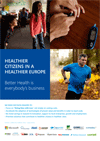
We need decision makers to:
- Focus on "Doing New with Less", not simply on cutting costs.
- Re-invest savings in research & innovation, support to local enterprises, growth and employment.
- Prioritize solutions that contribute to healthier citizens in healthier cities.
Download: Healthier Citizens in Healthier Europe (.pdf, 1.646 KB).
Download from eHealthNews.eu Portal's mirror: Healthier Citizens in Healthier Europe (.pdf, 1.646 KB).
Related news articles:
- Microsoft's Profile
About Microsoft in Health
Microsoft is committed to improving health around the world through software innovation. For over 16 years, Microsoft has been providing a broad portfolio of technologies and collaborating with partners worldwide to deliver solutions that address the challenges of healthcare providers, public health and social services, payers, life sciences organizations, and consumers. Today, Microsoft invests in technology innovation and works with health organizations, communities and over 20,000 partners around the world to make a real impact on the quality of healthcare.
About Microsoft
Founded in 1975, Microsoft (Nasdaq "MSFT") is the worldwide leader in software, services and solutions that help people and businesses realize their full potential.